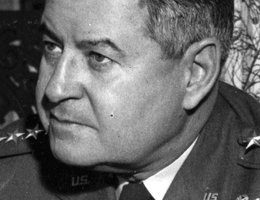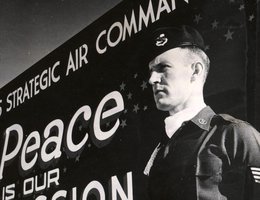
Patricia Jane LeMay Lodge (known as ‘Janie’) was the only daughter of Curtis and Helen (Maitland) LeMay. She was around nine-years-old when her family moved to Offutt. In 1998, she talked with historian Barbara W. Sommer about those years, her father’s career and her own upbringing.


For Jane, the Offutt years were good ones because the family was together.
"My grandparents lived on a wonderful street with very old homes. My mother had been born in the house that they lived in. They had a big porch . . . and, of course, on summer evenings, all the men that weren’t at war would sit out on the porches with their families. And I always felt deprived because I didn’t have a father that sat on the front porch. I think the first time my father came home, it was winter. I had made such a big deal about sitting on the porch, because I wanted everybody to know, ’Yes, I really did have a father.’ So, I remember that he sat out on the porch. It was below zero weather, but we sat out. I don’t think anybody else saw us."
So, Omaha was a good move, even if her mother may have been confused at first. "I remember him coming home and saying that they were moving to Omaha, Nebraska. I remember my mother saying, ’Where is it?’ "
Housing was a problem even for the commanding general.
"I remember them saying it [Offutt] had been old Fort Crook, and that the Army, when they moved out, they took everything that wasn’t nailed down. So, there was practically nothing there except the old quarters that were built in 18-something."
She was aware of the challenges her father faced in building a professional force for SAC, and she watched as her mother because involved as well. Both were concerned by the toll that long separations took on the families of the air crews.
"In order for the officer or the airman to do his job, to be away on TDY [temporary duty], to be gone away from his family, he has to know his family is being taken care of at home. This is when my mother started the Dependent’s Assistance. It is now called Family Services. My mother started that. That was [so] that you had support at home. The wives all got together. If a tragedy happened, there was someone there to help that family. Or if a new family moved in, it was kind of like the Welcome Wagon. They would be there for the family so that the husband could leave town and feel the family was well taken of."
The life of a daughter of a general was similar to those of her friends — Jane remembers a car pool that brought children of base personnel to various schools in Omaha — but she also remembers guards who would specifically patrol outside her home during tense times.
In the end, Jane has good memories of Offutt and Omaha. "It was wonderful. I consider Nebraska my home because I have lived there more than any other place."